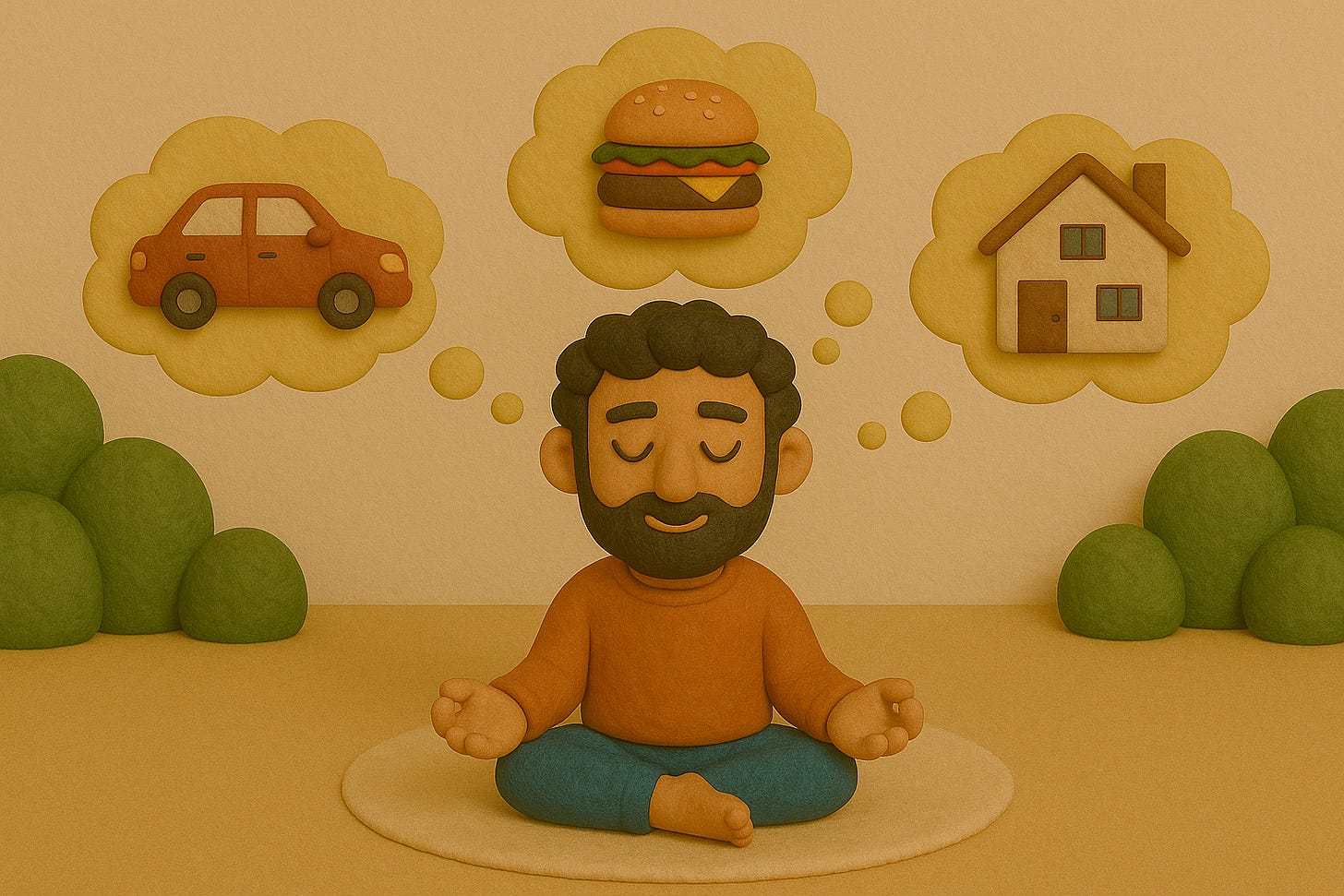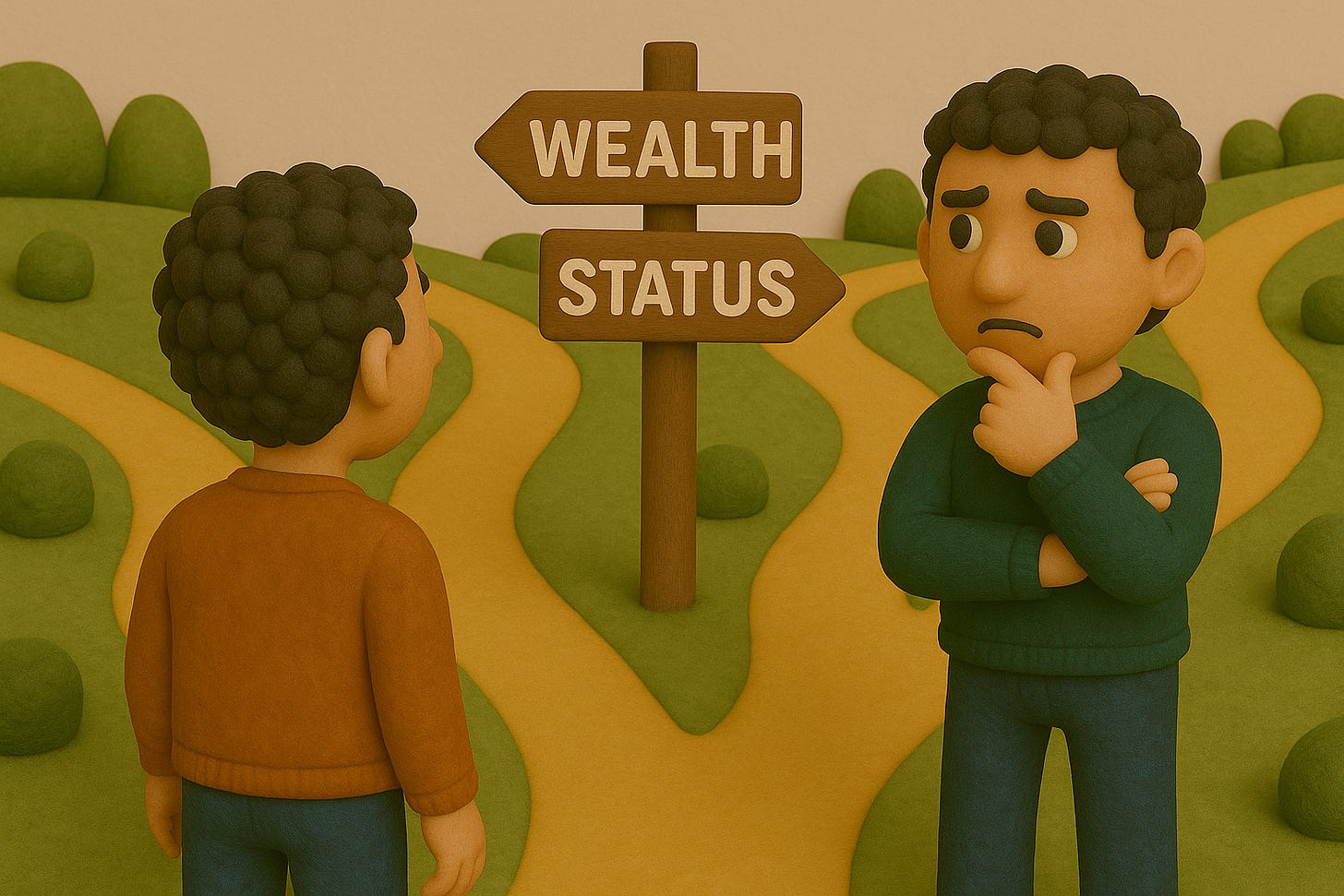5 Life-Changing Ideas I Learned from Naval Ravikant
Lessons about Happiness, Wealth, Desire, Career & more
Today, I want to share five key ideas I’ve learned from Naval Ravikant—ideas that have completely reshaped how I think about life, happiness, and success.
If you’re not familiar with Naval, he’s a successful entrepreneur, investor, and thinker best known for his unique philosophy around building wealth and happiness. His ideas, captured in The Almanack of Naval Ravikant, have reached millions of people, and for good reason.
If you haven’t read the book, I highly recommend it. It’s free, and it reads more like distilled wisdom than a traditional book. It’s divided into two parts — health and happiness — both equally profound.
Here’s what I’ve learned from Naval that stuck with me the most.
Most people chase the wrong things. They chase status, not freedom. They chase goals, not peace. They play stupid games and wonder why they get stupid prizes.
But Naval’s philosophy offers something else entirely: a blueprint for becoming wealthy, happy, and free, by being radically yourself.
These 5 ideas will shift how you think about success, work, happiness, and life itself.
Here’s what we’ll cover:
How to productize yourself and become irreplaceable
The surprising way happiness works (and why it can be trained)
What it means to desire less and live peacefully
The core principles of wealth creation
Why you should always optimize for the long term
Productize Yourself
Naval’s core idea around success can be summarized in two words: productize yourself.
You do that by developing something Naval calls specific knowledge: a unique blend of skills and experiences that only you can bring to the world.
Specific knowledge cannot be learned nor taught. It’s something you build by following your curiosity — relentlessly.
Find what “feels like play” to you, but looks like work to others.
If you find that, you will outcompete everyone, because you are doing it for fun, while others are doing it for work.
Your unique combination of skills and knowledge is what makes you the best person in the world at “being you”.
Don’t build skills just because they’re trendy. Don’t climb ladders leaning against the wrong walls. Instead, chase what you’re curious about. And do that obsessively. Eventually, that curiosity turns into mastery, and that mastery becomes leverage.
And once you productize yourself, you become irreplaceable.
Happiness Is a Skill
Happiness isn’t some random emotional state that happens to you. According to Naval, happiness is a choice and a practice.
He describes a dynamic between these two states:
“Peace is happiness at rest. Happiness is peace in motion.”
That means happiness isn’t about adding more pleasure. It’s about subtracting needless suffering. And most suffering doesn’t come from your circumstances, but from your reaction to them.
That’s why Naval argues that happiness starts with accountability. You’re responsible for how you react, no matter what life throws at you.
If you blame the world, you hand your power over. But if you take ownership of your internal state, you reclaim that power.
And here’s the twist: you can train your brain for happiness.
In any situation, you can find something good, even if it’s not obvious right away. Every time you choose gratitude, you rewire your mind. Every time you reflect on the good—even when things suck—you’re becoming a happier person.
But there’s another key factor that shapes happiness: desire.
Choose Desires Carefully
One of Naval’s best lines is:
“Desire is a contract you make with yourself to be unhappy until you get what you want.”
So if you’re constantly craving, comparing, or chasing… you're signing up for unhappiness.
However, he acknowledges that not all desires are bad. Desire fuels ambition. It increases your chances of success. By temporarily trading happiness for a goal, you activate internal motivation and drive.
The key is to choose your desires carefully.
Pick one overwhelming desire. It’s okay to suffer for something meaningful. But you should not stack 10 meaningless desires and suffer under all of them.
Ask: is this desire worth the unhappiness I’ll feel until I get it? f it’s not, drop it.
Build Wealth, Not Status
Most people chase status: Money as a scoreboard, titles, or popularity—because it gives the illusion of meaning.
But Naval draws a clear distinction:
Wealth is assets that earn while you sleep.
Money is how we transfer time and wealth.
Status is ranking in a social hierarchy.
Chasing wealth leads to freedom. Chasing status leads to comparison and anxiety.
Wealth is created by giving society what it wants but doesn’t yet know how to get—at scale. That means building, creating, and serving others in unique ways.
In order to capture that wealth, you need ownership.
“You’re not going to get rich renting out your time. You must own equity.”
And to extend your impact, you need leverage: code, media, capital, or people. Combine that leverage with specific knowledge, and your earning potential goes exponential.
He argues that by understanding these principles, wealth creation, just like happiness, can become a skill that is trainable.
Play The Long-Term Game
The final Navalism that changed how I approach everything:
“Play long-term games with long-term people.”
This applies to business, relationships, health, learning—the compound effect works everywhere. The best things in life always come from thinking and executing for the long term.
The people you surround yourself with determine your trajectory. Are you around people who are chasing status? Or people who are building meaningful things?
Long-term games require trust. They require shared values. And they reward consistency.
You don’t win big by jumping trends every month. You win by staying in the game longer than others. Compounding rewards go to those who stick it out.
What does that look like in practice?
Build your reputation slowly. It’s a long-term asset.
Invest in relationships before you need them.
Create things that last, not things that impress.
If you keep showing up, when everyone else quits, you become the person who “got lucky.”
Final Thoughts
What Naval teaches us is simple, but it’s not always easy.
I think the common thread in all of Naval’s ideas is this: you don’t need to be more like someone else. You need to be more like you.
None of this is flashy. There’s no “hack.” But there’s power in the simplicity.
Build specific knowledge. Take ownership of your happiness. Choose your desires carefully. Accumulate assets. Play long-term games. And stop measuring yourself by status or comparison.
If you internalize just one of these ideas, your trajectory changes.
If you practice all of them?
I’m willing to bet you’re gonna have a damn good life.
See you next Saturday.
Tobi
PS: I could talk for hours about Naval, so I might do a part two at some point in the future ;)
If this article sends even one reader down the Naval rabbit hole, that’s a win in my book🤗








Very informative!
Thanks for sharing..
Would love to read more like this
He is so good. I frequently keep going back to his book 'The Almanack of Naval Ravikant' as there's so much to learn, and his tweets too! :)